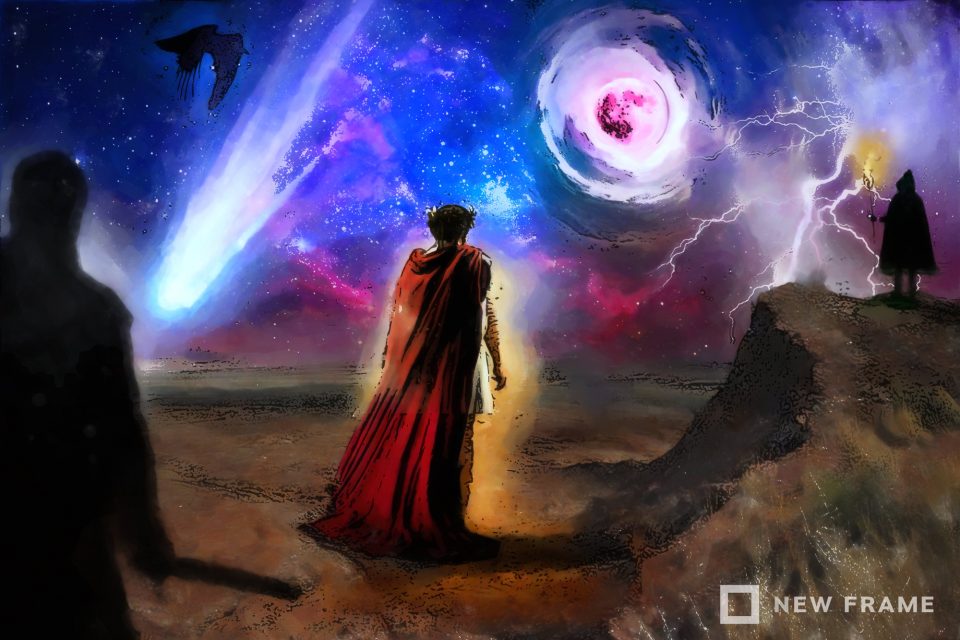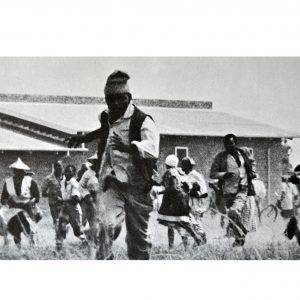The Ides of March: Omens and hopeful resistance
The month of March holds many memories in South Africa, of loss and liberation, from the Sharpeville massacre to the untimely death of Mthokozisi Ntumba during the recent student protests.
Author:
29 March 2021

Shakespeare’s 23rd play, Julius Caesar, is a dramatic tragedy rooted in deception and murder. The story starts with Roman senator Marcus Brutus being conned into conspiring to assassinate Julius Caesar, led by war general Cassius. Brutus is friendly towards Caesar and hesitant to kill him.
The two main conspirators reason that the assaination is an act of deep altruism, as Caesar is fast becoming a tyrant. They say he ought to be killed to prevent him from acting against the people of Rome if he were ever given power over the crown.
On the eve of what we now know as the Ides of March, the conspirators meet and reveal that they have letters of support from the Roman people to persuade Brutus to join their plan. He reads the letters and, after much moral debate, decides to join the conspiracy. The letters however, are forged.
In the second scene of the first act, we are introduced to the soothsayer. Aware of the assassination plot, he warns Caesar cryptically: “Beware the Ides of March.” Caesar, arrogant and ignorant, demands that the soothsayer appear before him, to see his face. When instead the warning is simply repeated, Caesar dismisses it, saying, “He is a dreamer, let us leave him.”

Two acts later, Caesar is assassinated on the steps of the Senate. The plot is rooted in historical reality. Julius Caesar was indeed assassinated on the Ides of March – 15 March – in the year 44 BC and the now famous phrase “beware the Ides of March” has come to signify disastrous news or bad omens.
This despite that it was initially an ancient Roman marker used to reference dates in relation to lunar phases. Ides simply referred to the first full moon of a given month, which usually fell between the 13th and 15th. However, as is often the case with the ways ideas are mobilised through popular culture, the meaning of the phrase has moved far beyond its original definition.
In South Africa, the soothsayer’s warning about the Ides of March seems to have transcended place and time.
A calendar of bad omens
The month of March feels like an immense repository of painful and turbulent political memories in South Africa, both old and new. Yet now there is an inversion of the origin story, as it is likely the elites who are killing the most oppressed. But the deceit remains. The missives and discourse that reach and stem from the elites about impoverished people are also fraudulent, plainly not rooted in reality.
On 21 March 1960, police officers opened fire on a group of peaceful protesters who sought to contest the oppressive pass laws. This is the story of the Sharpeville massacre, which marked a turning point in the struggle against the apartheid regime.
Related article:
The anniversary of the massacre is remembered the world over on the International Day for the Elimination of Racial Discrimination. As is often noted, our liberal democracy has chosen a new moniker for Sharpeville Day: Human Rights Day. It’s a name that is wholly unspecific and unclear about the sacrifices that led to the end of apartheid as a legally binding system.
On the anniversary of the Sharpeville massacre 25 years later, members of the South African police once again opened fire on a crowd of people gathered on Maduna Road between then Uitenhage and Langa township in the Eastern Cape. They had been attending the funeral of one of six people slain by the police on 17 March 1985. The police killed 35 people and wounded 27.
Years later, 10 March 2021 marks a new anniversary, the avoidable and callous death of a young man shot by the South African Police Service in Braamfontein, Johannesburg. In the days and hours after his death, we learnt that his name was Mthokozisi Ntumba. He was a 35-year-old father of three, killed as he left a clinic.
Related article:
The story of this anniversary, however, is not dissimilar to an anniversary we will commemorate in the new month.
The state murdered Andries Tatane 10 years ago, on 13 April 2011, in Ficksburg in the Free State. Police shot Tatane, only 33 years old, during a protest over state corruption and water shortages. Seven police officers accused of his assault and murder were acquitted in the Ficksburg regional court in March 2013. Acquitted for having murdered a man for daring to contest the oppressive infrastructure of the South African democratic state 23 days after the 21 March Human Rights Day commemorations.
Tatane and Ntumba are not the first people the police have killed during a protest since the end of apartheid. The police killed student Michael Makhabane on the campus of the former University of Durban-Westville in 2000, during a protest against the exclusion of impoverished students. The police also killed Solomon Madonsela in Ermelo 10 years ago. Nateniel Julies was killed only last year in Eldorado Park. The list continues. An ever- growing list.
Related article:
The Independent Police Investigative Directorate has probed the killings and deaths in custody of dozens of children since 2012. Almost none of these cases have resulted in convictions, as reported by Daneel Knoetze in his 2020 Viewfinder report.
The police terrorised impoverished Black South Africans simply for existing during the national Covid-19 lockdown. The four police officers arrested in connection with Ntumba’s death were each granted R8 000 bail on 26 March. We should not forget that their boss, Bheki Cele, told them to “shoot to kill” some years ago.

A luta continua!
Despite its popular invocation, the Ides of March once signified the new year, which meant a time for celebrations and rejoicing in the ancient Roman calendar. Perhaps in knowing this, there is some opportunity to tell stories that give us hope and energise us. For instance, the story of a young South African girl born on 4 March 1932 who would later become a political and cultural icon on the African continent: Miriam Makeba.
On her seventh studio album, Welela, recorded in 1990, Makeba sings A Luta Continua. The South African singer popularised the Mozambique-inspired song, which her daughter Bongi wrote for her after attending the independence ceremony of Mozambique in 1975.

“A luta continua” was the rallying cry of the Mozambique Liberation Front (Frelimo) during the country’s war for independence. The first president of Frelimo, Eduardo Chivambo Mondlane, coined the slogan used to rally the population in the liberated zones of Mozambique during the armed struggle against Portuguese colonial rule.
On the record, Makeba sings:
My people, my people
Open your eyes
And answer the call of the drum
Frelimo, Frelimo
Samora Machel
Samora Machel has come
Maputo, Maputo
Home of the brave
Our nation will soon be as one
Frelimo, Frelimo
Samora Machel
Samora Machel has won
Mozambique a luta continua
A luta continua, continua
Mozambique a luta continua
A luta continua, continua
In these words, there is recognition of the continued struggle against oppression. Within this, we are charged to remember our humanity and “the human touch”, as another cultural icon, Nina Simone, urged in her 1994 song, Human Touch.
Makeba’s anthem ends in solemn prayer: “And to those who have given their lives. Praises to thee.”
Many years later, in this month that marks remembrance of our humanity, rights and the immense sacrifices to attain it, these words are:
A prayer for Ntumba and the students that have now been emboldened by his memory and continue to protest across the country in his name.
A prayer for those brutalised by the state, both victims and perpetrators who have lost their lives in the crossfire of party politics.
A prayer for the impoverished and landless who cling to the memory of Robert Sobukwe and his messages of radical justice and unadulterated love.




